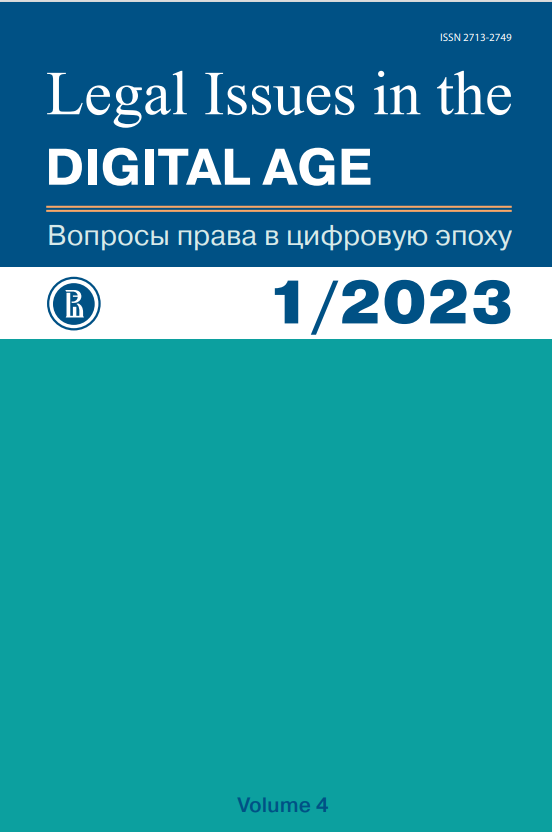Computer Games vs Law: Virtualization and Transformation of Political and Legal Institutions
Abstract
The paper provides an analysis of virtual reality as a subject of regulation while underlining the similarity of principles in gaming and regulatory activities as the elements of virtual reality. A deeper insight into the relationships between regulatory and gaming activities allows to make a statement that gaming provides a tool for situational analysis to identify the most rational action among the available alternatives thus offering a way to construct a legal reality. Assuming that people will make decisions by weighing costs and benefits to maximize the “utility”, and will interact with others by balancing preferences and constraints, the immersion into the gaming environment and observation of the process of rational decision-making will allow to construct predictive and explanatory models for pubic authorities to organize a relatively efficient law-making process. Moreover, the reciprocal influence of the gaming and legal environment has been persistently ignored by the law enforcement practices, only to result in legal gaps. A careful and comprehensive study of gaming as a legal phenomenon is thus a prerequisite of balanced and adequate lawmaking as well as enforcement. Therefore, this study purports to examine the points of contact between the gaming and the legal reality, and assess the existing legal gaps and prospects of creating and eventually applying “virtual” law. The methodology of the study includes general philosophic and scholar methods (analysis, synthesis, logical and systemic methods), specific research and legal methods (including formal legal analysis). The authors propose to make a definition of virtual law and to identify the levels of virtual environment. In analyzing the virtual environment, the authors conclude that it needs to be viewed through the lens of legal regulation since the virtual nature of computer games gives rise to socially important and potentially controversial interactions between players, platforms and developers that need to be mediated. The authors finally conclude that superficial and skeptical attitude of jurisprudence towards the gaming industry is unacceptable while regulatory problems have to be addressed both in science and law. Internationally, the legal systems are already developing a set of provisions — virtual law, Internet law — designed to regulate socially important aspects of computer games
References
Arkhipov V.V. (2019) The operation of legal provisions in the digital media environment and semantic limits of law. Pravovedenie=Legal Studies, vol. 63, no. 1, pp. 8–27 (in Russ.) DOI: https://doi.org/10.21638/spbu25.2019.101
Azizov R.F. (2020) Regulating the Web: History, Theory, Comparative Studies. Saint Petersburg: Aleteya, 266 p. (in Russ.)
Baitin I.М. (2005) The essence of law (modern legal understanding at the turn of the century). Мoscow: Pravo i gosudarstvo press, 544 p. (in Russ.)
Berger P., Luckmann Т. (1995) The Social Construction of Reality. A Treatise on Sociology of Knowledge. Мoscow: Medium, 323 p. (in Russ.)
Duranske B. (2008) The Virtual Law. Navigating the Legal Landscape of Virtual Worlds. Chicago: American Bar Association, 461 р.
Galkin D.V. (2007) Computer Games as a Phenomenon of Modern Culture. Gumanitarnaya informatika=Humanitarian Informatics, no. 3, pp. 54–72 (in Russ.)
Kane S., Duranske B. (2008) Virtual Worlds, Real World Issues. Landslide, vol. 1, no. 1, pp. 9–16.
Kovalenko Е.Yu., Shavandina О.А., Tydykova N.V. (2021) The Legal and Economic Regulation of Relationships in Athletics. Barnaul: Altai State University Press, 455 p. (in Russ.)
Коvtun Е.V. (2009) The History of Legal Regulation of Gambling in Russia. Мoscow: Maska, 240 p. (in Russ.)
Lastowka G. (2011) Virtual Justice. The New Laws of Online Worlds. New Haven (Conn.): Yale University Press, 240 р.
McGonigal J. (2018) The Reality is Broken. Why Games Make us Better and How they Can Change the World. Moscow: Mann, Ivanov i Ferber, 384p. (in Russ.)
Rassolov I.М. (2003) The Law and the Internet. Theoretical Issues. Мoscow: Norma, 336 p. (in Russ.)
Smirnova Е.О., Sokolova М.V. (2013) Right to Play Games: a New Commentary to Article 31 of the Convention on the Rights of the Child. Psikhologicheskaya nauka i obrazovaniye=Psychology and Education, vol. 18, no. 1, pp. 5–10 (in Russ.)
Sorokin V.V. (2007) The Concept and Essence of Law in the Russian Psyche. Мoscow: Yurlitform, 456 p. (in Russ.)
Shevtsov V.V. (2005) Card Games in Russia (late 16th — early 20th century). Tomsk: University Press, 244 p. (in Russ.)
Authors who publish with this journal agree to the Licensing, Copyright, Open Access and Repository Policy.










